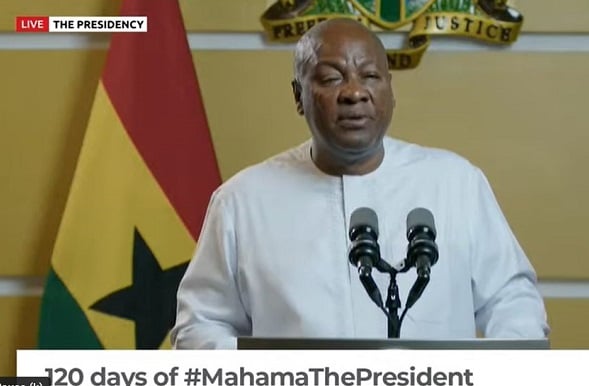President John Dramani Mahama of Ghana has outlined a comprehensive environmental agenda focused on preserving the nation’s forests, combating illegal mining, and reclaiming degraded lands. The core of this initiative is a proposed amendment to the Minerals and Mining Act, which will impose a complete ban on all mining activities within forest reserves. This decisive action aims to create a legally binding framework that safeguards these vital ecosystems from further exploitation. The amendment, he argued, would remove any ambiguity and establish a clear legal foundation for forest protection, ensuring the long-term preservation of these crucial resources. This decisive action underscores Mahama’s administration’s commitment to environmental stewardship and sustainable development, prioritizing the protection of Ghana’s natural heritage for future generations.
Addressing the pervasive issue of illegal mining, also known as “galamsey,” Mahama outlined a five-point strategy already underway. This multi-pronged approach encompasses regulatory reforms to tighten existing laws and enforcement protocols. Enhanced law enforcement efforts, including the deployment of joint task forces, aim to curb illegal activities and hold perpetrators accountable. This involves arrests and seizures of illegally operated mining equipment. Furthermore, fostering stakeholder collaboration is crucial to engaging communities and creating a shared responsibility for environmental protection. Finally, the reclamation of degraded lands is a vital component of this strategy, working to restore damaged ecosystems and mitigate the impacts of illegal mining.
The President highlighted significant progress in reclaiming forest reserves overrun by illegal miners. Seven out of nine affected reserves have been successfully reclaimed, with illegal operations halted and restoration efforts initiated. This demonstrates the government’s commitment to taking concrete action and reversing the damage caused by galamsey. Reclaiming these areas not only restores the ecological integrity of the forests but also helps to protect water bodies from further pollution. This effort contributes to a healthier environment and safeguards the well-being of communities dependent on these resources. The reclamation process is a complex undertaking involving various stages, from removing illegal miners and their equipment to replanting native vegetation and monitoring the recovery of the ecosystem.
Legislative reforms play a critical role in strengthening environmental protection. President Mahama pointed to the recent amendment to the Environmental Protection (Mining in Forest Reserves) Regulations. This amendment removes the President’s discretionary power to approve mining activities within forest reserves, eliminating a potential avenue for exploitation and strengthening the integrity of the ban. The legislative instrument, L.I. 2462, presented to Parliament, formalizes the ban and further reinforces the government’s commitment to protecting forest reserves. This change aims to ensure greater transparency and accountability in environmental decision-making processes, safeguarding against potential conflicts of interest and promoting sustainable resource management.
Beyond addressing illegal mining and protecting forests, President Mahama also emphasized the importance of proactive environmental initiatives. The “Tree for Life” reforestation program aims to plant over 20 million seedlings annually. This nationwide effort seeks to restore degraded lands, combat climate change, and instill environmental consciousness, particularly through the “One Child, One Tree” policy. This initiative engages communities, particularly young people, in the restoration and protection of their environment. By fostering a sense of ownership and responsibility, the program aims to create a more sustainable future for Ghana. Reforestation efforts are essential for mitigating the effects of climate change, improving air quality, and enhancing biodiversity.
Looking ahead, President Mahama underscored the importance of a multi-faceted approach to environmental protection. This includes continued enforcement of regulations, further policy reforms, the integration of technology for monitoring and enforcement, and ongoing community engagement. By combining these efforts, the government aims to create a more robust and effective system for environmental management. This comprehensive strategy seeks to achieve long-term sustainability by balancing development needs with the preservation of Ghana’s natural resources. The integration of technology, particularly in monitoring and surveillance, is expected to enhance the efficiency of enforcement efforts and provide valuable data for informed decision-making. Ultimately, the goal is to ensure a healthier environment, cleaner water bodies, restored forests, and stronger governance for the benefit of current and future generations.














